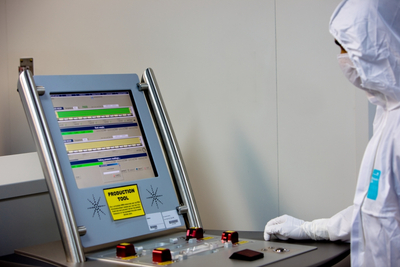Automation helping Australia’s medical devices industry
By Jason Thelander, CEO, Precision Mechatronics, North Ryde, NSW
Wednesday, 28 March, 2012
Australia has a vibrant medical devices industry focused on exporting its products and creating overseas markets. Companies in the Australian medical devices industry undertake a wide range of activities including the research, development, manufacture and distribution of products ranging from surgical gloves and syringes to artificial joints and hearts. It has been estimated that around 17,500 people are employed in the industry. (Source: AusMedTech.)
Australia also has a large and highly advanced medical device market. The Australian market for medical equipment and supplies was estimated to be US$4,027 million in 2010, equal to US$187 per capita, with Australia accounting for around 1.7% of the total world market (Espicom Business Intelligence Report: Medical Device Market, 2010, p.3). However, the Medical Technology Association of Australia (MTAA) estimated total annual revenue for the Australian medical technology industry to be $7.6 billion in 2009-2010 with this figure being extrapolated from various sources of data (www.mtaa.org.au).
The industry is unique in that it imports most of what it uses (98.8%) and exports most of what it produces (97.2%), mainly to the USA, New Zealand, Europe, Japan and the UK. The global nature of the industry means that its future viability and continued success will be based on its ability to develop competitive products for export markets.
To remain competitive in a relatively high-cost economy such as Australia, the application of automation is an essential ingredient in creating sustainable medical devices manufacturing businesses. The right investment in modern, custom-designed, custom-built and fully installed automation solutions will enable businesses to achieve success in increasingly competitive global markets and grow exports into the rapidly developing economies of the world.
When applied appropriately, the benefits are clear. Automation of the manufacturing process not only drives costs down, it improves quality, reduces waste, optimises energy use and achieves flexibility. Flexibility is important in this industry, as the need for productivity improvements is a constant challenge. Balancing production requirements against sales forecasts in a heavily regulated industry can make this difficult.
The nature of the finished product in the medical devices industry typically means that a unique manufacturing process is required, as opposed to traditional pharmaceuticals, where the equipment required is typically sourced off the shelf. This requirement for a unique process can provide the need for innovative ideas within large companies to improve their processes. Consequently, this will foster opportunities for firms that can provide custom-engineering and automation services.
While the Australian medical devices industry largely comprises SMEs - in particular, companies with fewer than 10 employees - the top end of the industry is represented by its two truly global players: Cochlear and ResMed.
Cochlear designs, manufactures and sells the Nucleus cochlear implant along with the Baha System bone conduction implant solution, with an estimated 250,000 cochlear implant/Baha recipients since establishment in 1981.
At the heart of Cochlear’s product development is one simple idea - innovation. In order to allow engineers to focus on continuing their innovation work, Cochlear outsources parts of the design and manufacturing of custom machinery for their production facilities. Custom engineering services company Precision Mechatronics has engaged with Cochlear in several projects over the last two years.

These projects have ranged from straight replication work, such as reproducing custom machinery in Precision Mechatronics’ North Ryde facility already designed and built previously by Cochlear projects, to projects requiring the development of custom solutions, a skill well suited to Precision Mechatronics’ experience in developing and optimising processes. These projects have ranged from the automation of labour-intensive processes, to solving material handling challenges. Precision Mechatronics has provided the full suite of its skills, including design, build, quality management and comprehensive documentation.
Process automation is a key driver to success for companies like Cochlear and all industries in Australia, where the currently high currency value, and relatively high labour costs among other factors, make the need for an efficient process critical. Process automation can contribute significantly to this.
Precision Mechatronics has recently delivered a production prototype unit to Cochlear, which via process automation will reduce the number of people movements within the cleanroom environment by at least an order of magnitude. The system is a benchtop unit that will remove the need for the operator to make tens of trips within the cleanroom. This offers multiple benefits: a better working environment for the operator, a more efficient process and also importantly for this regulatory environment, a more consistent process with the risk of human error reduced.
While the development of the medical device industry is open to speculation, the presence of the big two, Cochlear and Resmed, does provide an excellent pool of talent to base the growth of the industry on. Already there are several small companies that have taken the lead from these two and are looking to make the next breakthrough.
By Jason Thelander, CEO, Precision Mechatronics, North Ryde, NSW
Performance without compromise: enhancing manufacturing quality with single-controller solutions
Most factory automation systems today have mutiple control systems that don't communicate...
From wartime wisdom to smart manufacturing: the power of condition monitoring
The shift from reactive to predictive maintenance is really a cultural transformation empowered...
Efficiency in intralogistics: AMRs and industrial 5G
How industrial 5G enhances AMR applications and performance.







